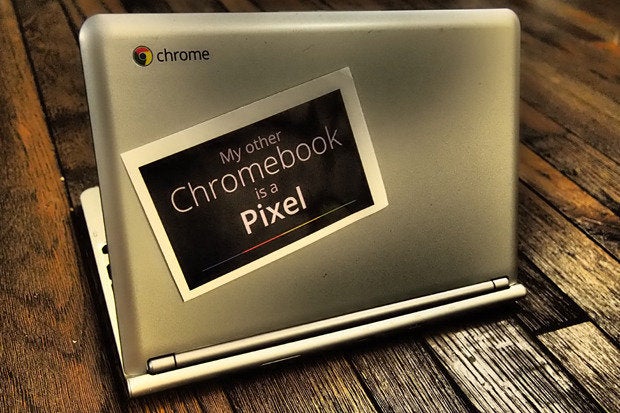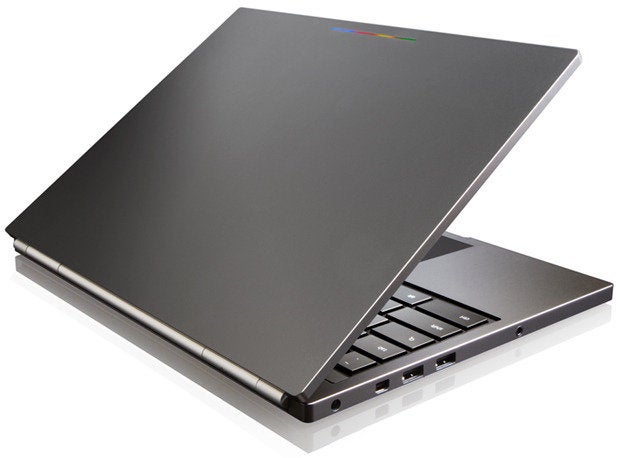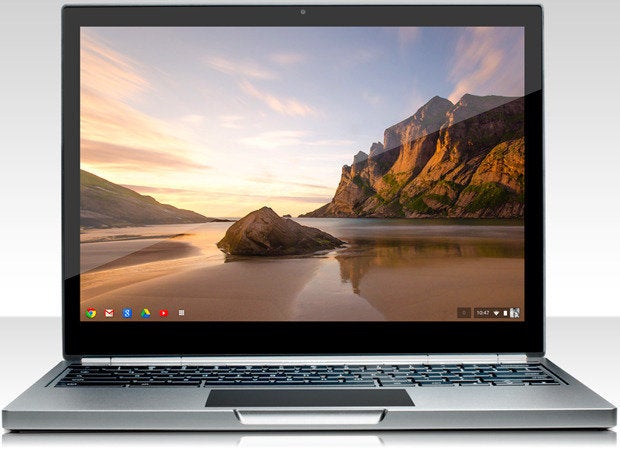Chromebook Pixel revisited: 18 months with Google's luxury laptop
Is it crazy to pay $1300 for a Chromebook? Some reflections after a year and a half of living with Google's luxurious Pixel.

When you stop and think about it, it's kind of astonishing how far Chromebooks have come.
It was only last February, after all, that Google's Chromebook Pixel came crashing into our lives and made us realize how good of an experience Chrome OS could provide.
At the time, the Pixel was light-years ahead of any other Chromebook in almost every possible way: From build quality to display and performance, the system was just in a league of its own. And its price reflected that status: The Pixel sold for a cool $1300, or $1450 if you wanted a higher-storage model with built-in LTE support.

Today, the Pixel remains the sole high-end device in the Chromebook world (and its price remains just as high). But the rest of the Chrome OS universe has evolved -- and the gap between the Pixel and the next notch down isn't quite as extreme as it used to be.
So how has the Pixel held up 18 months after its release, and does it still justify the lofty price? I've owned and used the Pixel since last spring and have evaluated almost every other Chromebook introduced since its debut.
Here are some scattered thoughts based on my experiences:
1. Hardware and design
As I said when I revisited the device a year ago, the Chromebook Pixel is hands-down the nicest computer I've ever used. The laptop is as luxurious as it gets, with a gorgeous design, premium materials, and top-notch build quality that screams "high-end" from edge to edge.

We're finally starting to see some lower-end Chromebooks creep up in the realms of design and build quality -- namely the original HP Chromebook 11 (though it's simply too slow to recommend for most people) and the ThinkPad Yoga 11e Chromebook (which is sturdy and well-built but not exactly sleek) -- and that's a very good thing. In fact, that's a large part of what Google was ultimately trying to accomplish by creating the Pixel in the first place. Think about it.
While those devices may be a step up from the status quo, though, they're not even close to the standard of premium quality the Pixel delivers. When it comes to hardware, the Pixel is first-class through and through while other products are varying levels of economy.
The Pixel's backlit keyboard and etched-glass trackpad also remain unmatched in their premium nature. Typing and navigating is a completely different experience on this laptop than on any other Chromebook (and, for that matter, on almost any non-Chrome-OS laptop, too).
The same goes for the Pixel's spectacular speakers. Other Chromebooks are okay, but none is anywhere near this outstanding.
2. Display
The display -- man, oh man, the display. The Pixel's 12.85-in. 2560-x-1700 IPS screen is like candy for your eyes. The vast majority of Chromebook screens (yes, even those that offer 1080p resolution) are still using junky TN panels and consequently look pretty awful. The two exceptions are the same systems mentioned above -- the HP 11 and the ThinkPad Yoga 11e -- but while those devices' displays reign superior in the sub-$500 category, their low resolution is no match for the Pixel's crystal-clear image quality.

I continue to appreciate the Pixel's touchscreen capability to this day, too: While I certainly don't put my fingers on the screen all the time, it's really nice to have the ability to reach up and tap, scroll, or pinch when I feel the urge. For as much time as I spend using smartphones and tablets, it seems completely natural to be able to do that with a laptop as well. (Admit it: You've tried to touch a non-touchscreen laptop at some point. We all have.)
I will say this, though: The time I've spent recently with the Yoga 11e has definitely gotten me keen on the idea of a Chromebook being able to convert into a tablet-like setup. After using that device, I sometimes find myself wishing the Pixel's display could tilt back further and provide that sort of slate-style experience.
3. Stamina and performance
At about five hours per charge, the Pixel's battery life is passable but not exceptional -- especially compared to the eight to 10 hours we're seeing on some systems these days. As I've mused before, stamina is the Pixel's Achilles' heel.
Performance is where things get particularly interesting: When the Pixel first came out, its horsepower was unheard of for a Chrome OS device. I could actually use the system in my typical power-user way, with tons of windows and tabs running at the same time and no slowdowns or multitasking misery. Compared to the sluggish Chrome OS systems we'd seen up to that point, it felt like a full-fledged miracle.
The Pixel's performance is no less impressive today, but what's changed is that other Chrome OS systems have actually come close to catching up. These days, you can get solid performance in a Chromebook for around $200 with the various Haswell-based systems. The newer Core i3 devices give you a little more punch for around $300. Neither quite reaches the Pixel's level of snappiness and speed, but in practical terms, they're not too far behind.
So for most folks, performance alone is no longer a reason to own the Pixel. It's an important part of the Pixel, for sure, but if that's the only thing you're interested in, you'd do far better to save yourself the cash and get a lower-end Chromebook with decent internals.
To Pixel or not to Pixel?
What is a reason to own the Pixel, then? Simple: to enjoy a top-of-the-line Chrome OS experience with all the amenities you could ask for. The device's hardware quality and design, keyboard and trackpad, speakers, and display add up to make a wonderful overall user experience no other Chromebook can match.
As for whether it's worth the price, well, that's a question only you can answer. Is a high-end car worth the premium over a reliable but less luxurious sedan? For someone like me, probably not. But for someone who's passionate about cars, spends a lot of time in a vehicle and appreciates the elevated quality, it just might be.
The same concept applies here. The Pixel remains a fantastic luxury option for users sold on the Chrome OS concept -- people like me who rely heavily on cloud storage and spend most of their time using Web-centric apps and services.
Like with any luxury item, the level of quality the Pixel provides certainly isn't something anyone needs, but its premium nature is something a lot of folks will enjoy -- and that's as true today as it was last year.

Copyright © 2014 IDG Communications, Inc.





